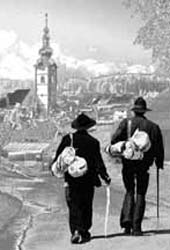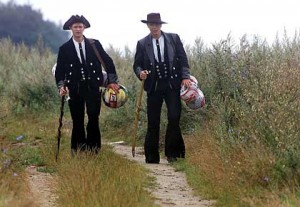Last week while rehearsing in New York, I visited with my violinist friend Eva. She had just returned from a long trip to Europe during which she hiked the Alps for seven days – along the ridges at the very top that were only wide enough to walk on, up rock faces, down again into valleys when the peaks weren’t passable. For two days she walked “in a cloud” only able to see her own feet, missing out completely on the view she knew was there around her, only to have the sky clear and see an even more stunning view than she had ever imagined!
 Over the course of the week hiking, she and her friend would stay in little mountain lodges. Nothing fancy, but they could sleep on a bed, have a shower, rinse their clothes, and eat a hot meal. They would often lodge with other hikers on the same path and had the opportunity to get to know some of them. Eva told me about two of them who were particularly unusual. They are known as Journeymen. They are young men (and occasionally women these days) who have studied one facet or another of handiwork – woodwork, roofing, furniture making, etc., and as a part of their quest to become master craftsmen, they must essentially be pilgrims for three years and one day. It is a very old tradition dating back to the Middle Ages. They must not travel within 50 kilometers of their hometown. They are to travel far and wide – all across the world if they wish – observing master craftsmen and the varieties techniques and methods employed world-wide. They are not allowed to turn a profit during this time. They are trained and therefore are paid wages for any work they do, but they must spend that money for their travels. They are not allowed to book hotel reservations or take public transportation (though they must do the latter on occasion these days, especially when traveling across oceans!). The idea is to get into the community, to rely on the hospitality of others, and to learn from and be of service to the communities or people who take them in. In addition, they distinguish themselves by wearing the very particular and symbolic clothing of a Journeyman, may only pack a small rucksack that they carry, and they travel with a walking stick that they have made themselves.
Over the course of the week hiking, she and her friend would stay in little mountain lodges. Nothing fancy, but they could sleep on a bed, have a shower, rinse their clothes, and eat a hot meal. They would often lodge with other hikers on the same path and had the opportunity to get to know some of them. Eva told me about two of them who were particularly unusual. They are known as Journeymen. They are young men (and occasionally women these days) who have studied one facet or another of handiwork – woodwork, roofing, furniture making, etc., and as a part of their quest to become master craftsmen, they must essentially be pilgrims for three years and one day. It is a very old tradition dating back to the Middle Ages. They must not travel within 50 kilometers of their hometown. They are to travel far and wide – all across the world if they wish – observing master craftsmen and the varieties techniques and methods employed world-wide. They are not allowed to turn a profit during this time. They are trained and therefore are paid wages for any work they do, but they must spend that money for their travels. They are not allowed to book hotel reservations or take public transportation (though they must do the latter on occasion these days, especially when traveling across oceans!). The idea is to get into the community, to rely on the hospitality of others, and to learn from and be of service to the communities or people who take them in. In addition, they distinguish themselves by wearing the very particular and symbolic clothing of a Journeyman, may only pack a small rucksack that they carry, and they travel with a walking stick that they have made themselves.
 There’s something about the life of a pilgrim that has always struck me. First of all, there is a central purpose – some kind of thread that runs through the length of the journey. There is a specific path to be walked, or a particular destination. Pilgrims share the same purpose as their fellow travelers. For these Journeymen, their craft is their thread, learning as much as they can from masters in lands other than their own, so that it may inform their own craftsmanship.
There’s something about the life of a pilgrim that has always struck me. First of all, there is a central purpose – some kind of thread that runs through the length of the journey. There is a specific path to be walked, or a particular destination. Pilgrims share the same purpose as their fellow travelers. For these Journeymen, their craft is their thread, learning as much as they can from masters in lands other than their own, so that it may inform their own craftsmanship.
In our lives as musicians, music is naturally a “thread” running through our lives, probably along with one or two more “threads” of whatever might be most important to us. Music is a beautiful thread to have, I think, and can be so enriching as it leads us to learn not only about music, but also art, architecture, and history. We can travel and learn what other musicians have to say about their craft, their lives, or just hear them play, and let these encounters inform us and our own playing and lives.
Another thing that strikes me about the Journeymen is the length of their journey and the amount of constant trust required of them in their wanderings, as they encounter the unknown on a daily basis.
I don’t know about you, but I don’t mind a good long journey now and then – either a literal or figurative journey. A true endeavor! There is something about starting out on something monumental that can actually be freeing. You get into the car and you just settle in – because you’re in it for the long haul. It’s a little the same as distance running. I’ve only run one half-marathon in my life, but I sort of liked the feeling as I started my long runs. Your mind lets go a little bit knowing you’re going to be here for a while and you might as well settle in and relax and be in the here and now. Any long-term commitment or endeavor has the possibility of taking on this feeling if we let it, I think.
This summer, sometimes I feel a little bit like a pilgrim with all of my travels. But in reality, of course, I am not. I know where I will stay from one night to the next, and I am taking lots of public transportation. No need to hitchhike! But until the occasion arises in my life to go on a true pilgrimage I can use the things that are important to me in life (one of them being music) as my “threads” and attempt to integrate the spirit of a Journeyman into my life and commitments. Learning from those around me, having a spirit of adventure, and trusting that the needs of the unknown around the bend in the road will be met.
Happy Wanderings!
To read further about Journeymen and the tradition of going “auf der Walz”, check out these links:
